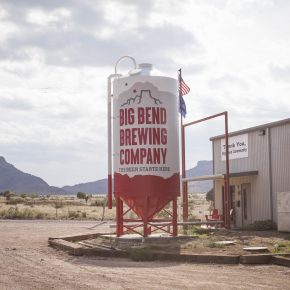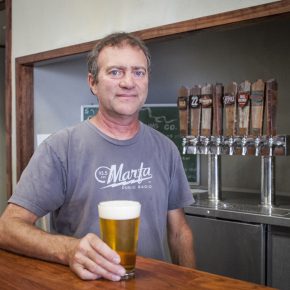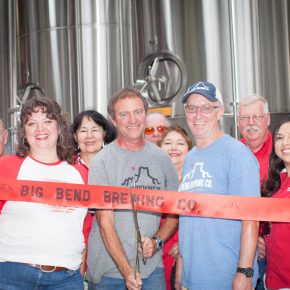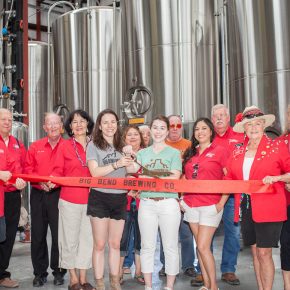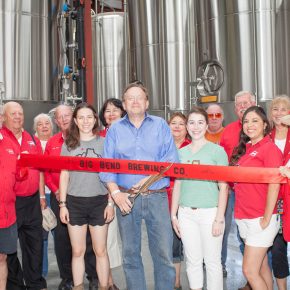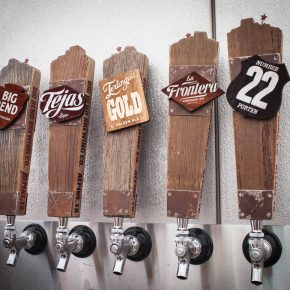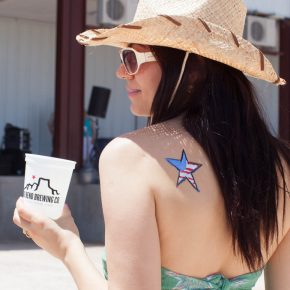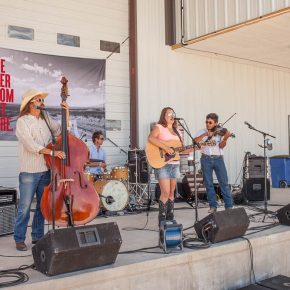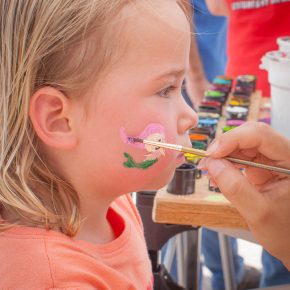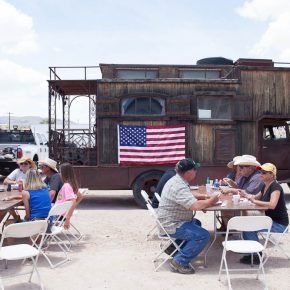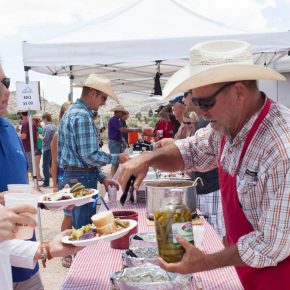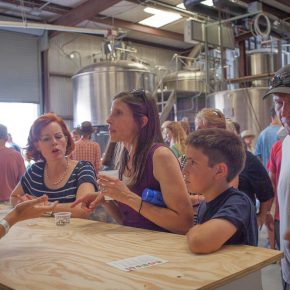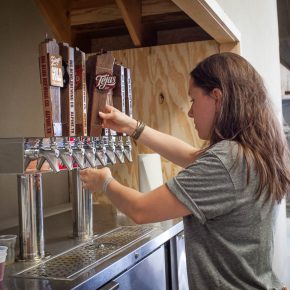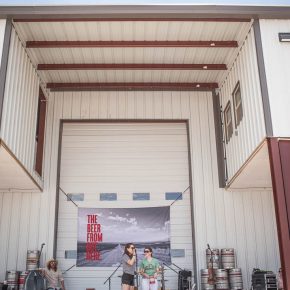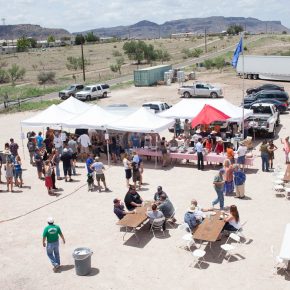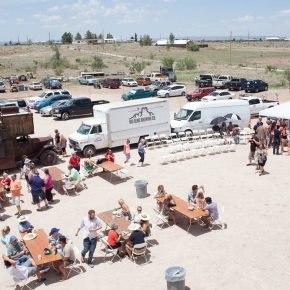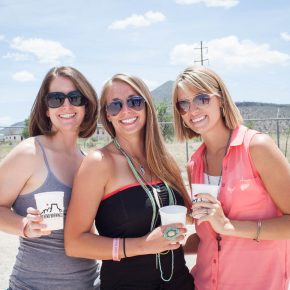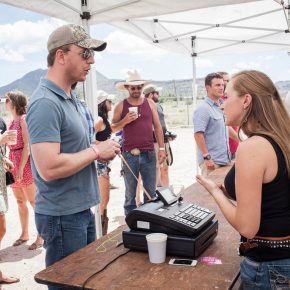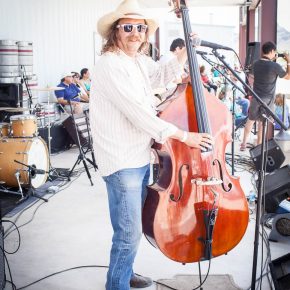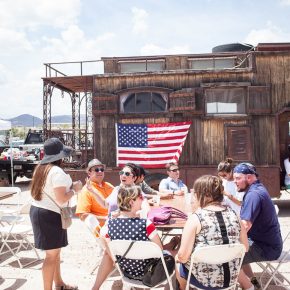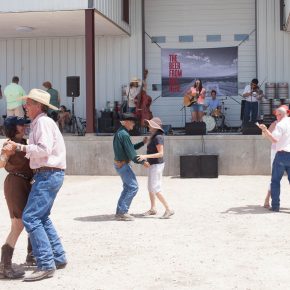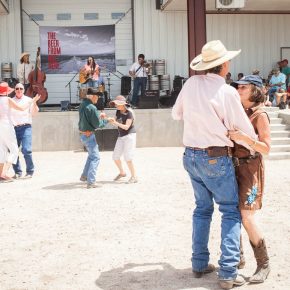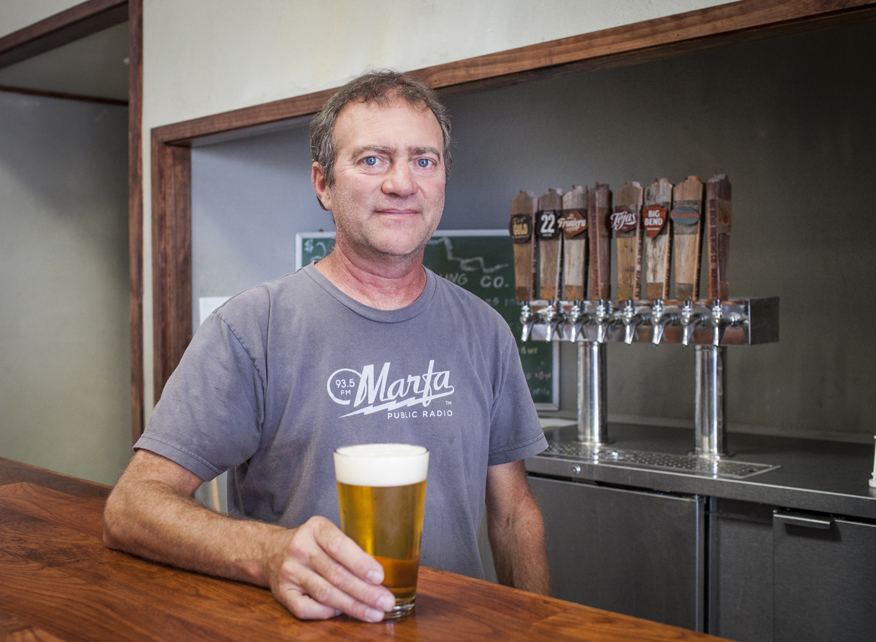 Steve Anderson loves beer. One of his fondest memories of beer goes back to the 1980’s when he took his first sip of Michelob Golden Pilsner. The taste was so nostalgic it reminded him of a time in the mid 1960’s when he and his father shared their first beer together. Steve would eventually move to Austin, TX, in pursuit of a college degree. His passion and love for beer never faded and curiosity led him to experiment with home brewing. While refining his skill, Steve would eventually become the brew master at the first ever brew pub in Texas—The Waterloo Brewing Company. Not long ago, as fate may have it, Steve moved from Austin to Sanderson, TX, and ultimately ending up in Alpine, TX, embarking on a joyous and successful new project doing what he loves most—making beer for Big Bend Brewing Company. Fusion had the opportunity to speak with Steve over a few lagers during BBBC’s expansion party this past summer.
Steve Anderson loves beer. One of his fondest memories of beer goes back to the 1980’s when he took his first sip of Michelob Golden Pilsner. The taste was so nostalgic it reminded him of a time in the mid 1960’s when he and his father shared their first beer together. Steve would eventually move to Austin, TX, in pursuit of a college degree. His passion and love for beer never faded and curiosity led him to experiment with home brewing. While refining his skill, Steve would eventually become the brew master at the first ever brew pub in Texas—The Waterloo Brewing Company. Not long ago, as fate may have it, Steve moved from Austin to Sanderson, TX, and ultimately ending up in Alpine, TX, embarking on a joyous and successful new project doing what he loves most—making beer for Big Bend Brewing Company. Fusion had the opportunity to speak with Steve over a few lagers during BBBC’s expansion party this past summer.
What was your favorite beer growing up?
Budweiser, for many years I was a Bud guy. And then I was turned onto some of the imports early on but then Sam Adams hit the market and I think a lot of us cut our teeth on that beer early on.
When did you start, or how did the idea come about that you wanted to brew your own beer?
Well, I did a little home brewing. I was bartending at this place called Texas Showdown in Austin for many years, including while I was brewing. There was a customer friend of mine who told me about home brewing and this is probably mid 80’s. So, there is a little store in Austin called Wheatsville Co-op—a little natural food store—the only place in town where you can buy home brew supplies. You know, you can get a hydrometer there, they have glass carboys for water and they have malt extract. So, I started dabbling in home brewing. As time went on, this bar I was working at, Showdown, the owner, Billy Forrester, who was my boss there, was waiting for something new. One year he and I went to the Great American Beer festival in Denver. The year before I had gone there, Davis Tucker, who owns North by Northwest in Austin, told me about this brew pub in Denver called The Wynkoop, which at the time was owned by John Hickenlooper who is now Governor of Colorado. I took Billy there to see it because it was pretty cool you know. By then I was home brewing somewhat, and he was quite impressed by this place, and we met the Brew master Russell Schehrer and John. On the flight back Billy turned to me and goes “that Wyncoop sure was something, wasn’t it,” and I said “yeah,” and he goes, “would you be interested in doing something like that?” “Heck yeah!” you know. So, we got back, the legislative session had just ended in Texas and the brew pub law failed. So Billy got to work, and over the next 2 years he worked real hard on working with the wholesaler’s to see what we could get from them—change of law wise—and he got it done. In the meantime I went to the Siebel Institute up in Chicago, which is a brewery school, and we opened the first brew pub in Texas called The Waterloo Brewing Company in 1993.
When you were home brewing what was the first beer you ever brewed?
I would suspect it was a Pale Ale. I honestly don’t recall. I think I was at the mercy of what the extract was in the can.
Is brewing beer an art?
I like to believe that it’s a culinary art. It is very much a science as well. There’s a lot involved in microbiology, chemistry, water chemistry, and engineering. There’s a lot of science in it. I know people that look it more as a science than an art and I know people that look it more as an art than a science. I kind of fall more on the art side than the science side. I understand the science, I have a lab—do all that part. I think it’s a culinary art more than anything. The ability to know what to blend and when, its not just taking some ingredients and making a product out of matching what you know from what you get the reports of the barley… you got to taste it, you got to handle it and taste it. Its just much like cooking.
How did you get involved with Big Bend Brewing Company?
I always wanted to do something out here. I was enchanted by this marvelous place and a gentleman, Harry Moss, who is the german brewer by trade, had a brew club here in Alpine and he was approached by one of the partners who wanted to do the same kind of thing. Harry thought about it and he called me and he said, “I’ve been approached to do this project I’m not so sure I want to, he’s got a very successful beer joint here in town that I frequent every single day. If I don’t want to do this, if I decide not to, would you be interested?” I said, “hell yeah, you know I would, that’s why you called me.” He called me back two weeks later and he said, “I decided I’m going to stay put with what I’m doing. I gave this partner your number.” Sure enough, 24 hours later I get this phone call (from the partner) telling me what he wanted to do and we batted around some ideas for a while. After thinking about it I was making pretty good money at my book and I was thinking…you’re not going to afford me if we do a brew pub, because there is not going to be enough business to merit what I need to make to maintain what I’m used to. Especially out here it’s more expensive. So, I kind of talked him into doing a production manufacturing facility, and then it just all went to shit and we out did it (laughs). Yeah, out in the middle of nowhere we have something like this! Pretty impressive!
 Why start BBBC in Alpine, TX?
Why start BBBC in Alpine, TX?
One reason was, we wanted the image to be Big Bend. It’s a central area, it’s a large enough city, there’s plenty of bars in it and it’s primarily where I wanted to live. That’s why we decided to do it here, and we have access to Terlingua, Ft. Davis, Marfa, and Marathon—which are the most important accounts for us in the tri-county area. lf we were in any other town around here…imagine if we were in Terlingua—it would be impossible. Alpine is a good central point of the tri-county area to go from, and we’re on 90 which takes us straight to 10 to get us to El Paso.
What does this expansion mean to BBBC?
It allows to make beer for once that we can actually supply the demand. Up until just a couple weeks ago we had three 30 barrel fermentors and one 15. The 15 was always Hefeweizen because it ferments so quickly you have to turn it around every week so that the yeast survives. One of the 30’s is always lager because it takes so long. So that leaves me with 2 tanks. The gold is always in one of them all the time. So, I have one tank to make the porter and the IPA. Porter takes about 2 weeks the IPA takes 3. So that’s 5 weeks all together with 1 tank to make 2 beers. So we are always running out of beer, we’re constantly running out of beer, we still are. We cannot beat the demand. This allows us to not only fill in all the taps that run dry and the shelves that run empty in this area and in certain areas of El Paso and Midland, but it allows us to expand.
Where do you see BBBC going after this expansion?
We are going to hit El Paso hard. That’s our primary target because El Paso is hot, it’s ready for it, it’s a great city! Just being there, just going there it’s like WOW these people are ready for it! Hoppy Monk and places like that are popping up everywhere and it’s just the right market. We’re really going to concentrate on that. We’re going to concentrate on Lubbock. West Texas is what we’re going to concentrate on mostly. Of course we want to get into the bigger cities but there’s no big rush.
For tours & beer tastings visit: bigbendbrewing.com
TEXT: ALEX DURAN | PHOTO CREDIT: JENNIFER BOOMER


